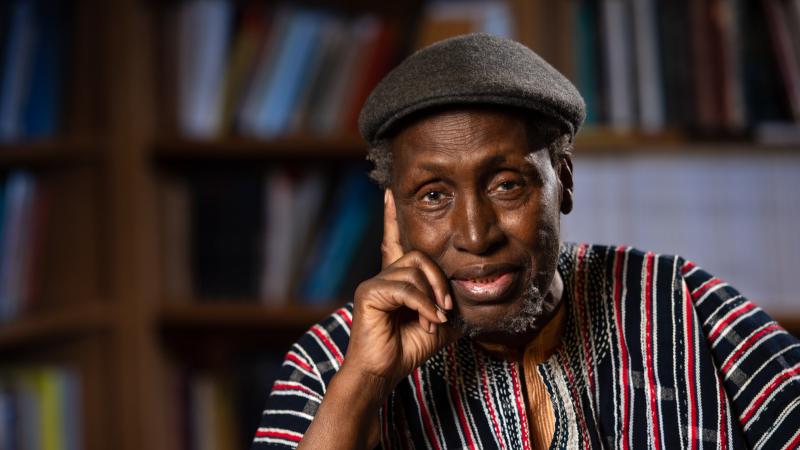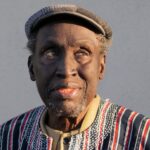Ngũgĩ wa Thiong’o, a towering figure in African literature, is celebrated for his profound contributions to Kenyan and global literary landscapes. Known for his novels, plays, and essays that critique colonialism and advocate for cultural reclamation, Ngũgĩ’s work resonates deeply with themes of identity, resistance, and decolonization. However, his personal life, particularly his marriages, has also drawn public attention, shedding light on the complexities of his legacy. This article delves into Ngũgĩ wa Thiong’o’s wives, his family dynamics, and the impact of his personal experiences on his literary career.
Early Life and Context: The Making of a Literary Giant
Ngũgĩ wa Thiong’o, born James Ngugi on January 5, 1938, in Kamiriithu, near Limuru, Kenya, grew up in a Gikuyu family during the turbulent period of British colonial rule. His father, Thiong’o wa Nducu, was a peasant farmer displaced by the British Imperial Land Act of 1915, and his mother, Wanjiku wa Ngũgĩ, was one of his father’s four wives in a polygamous household. The Mau Mau Uprising, a pivotal anti-colonial struggle, profoundly shaped Ngũgĩ’s worldview. His family faced direct consequences of the conflict: one brother was killed fighting for the Kenya Land and Freedom Army, another was shot during the State of Emergency, and his mother endured torture for suspected support of the resistance.
These early experiences of dispossession and resistance informed Ngũgĩ’s literary voice. His education at mission-run schools, Alliance High School, and Makerere University in Uganda equipped him with the tools to articulate the struggles of his people. By the 1970s, Ngũgĩ rejected his Christian name, James, and English as his primary literary language, embracing his Gikuyu heritage and writing in his native tongue to decolonize African literature. His works, including Weep Not, Child (1964), The River Between (1965), A Grain of Wheat (1967), and Petals of Blood (1977), established him as East Africa’s leading novelist.
Ngũgĩ’s First Marriage: Nyambura and a Family in Crisis
Ngũgĩ wa Thiong’o married his first wife, Nyambura, in 1961 while still a student at Makerere University. Little is known about Nyambura’s personal background, as Ngũgĩ has kept much of his private life out of the public eye. However, their marriage coincided with a period of intense political and personal turmoil. Together, they had six children: Thiong’o, Kimunya, Nduchu, Mukoma, Wanjiku, and Njoki.
Challenges During the Marriage
The marriage faced significant strain due to Ngũgĩ’s political activism and the repressive environment in Kenya under Presidents Jomo Kenyatta and Daniel arap Moi. Ngũgĩ’s outspoken criticism of the post-independence Kenyan elite, particularly through works like Petals of Blood and the play Ngaahika Ndeenda (I Will Marry When I Want), led to his arrest in 1977. He was detained without trial for nearly a year at Kamiti Maximum Security Prison, where he wrote Devil on the Cross on toilet paper. This period of imprisonment forced his family into exile, creating significant disruptions.
The pressures of Ngũgĩ’s activism, coupled with detentions and eventual exile to the United States, contributed to the collapse of his marriage to Nyambura. By 1978, after 17 years of marriage, the couple separated. Nyambura died in 1995, and Ngũgĩ, still in exile, was unable to attend her funeral due to political tensions in Kenya.
Allegations of Abuse
In March 2024, Ngũgĩ’s son, Mukoma wa Ngũgĩ, a writer and professor at Cornell University, publicly alleged that his father had physically abused Nyambura during their marriage. In a post on X, Mukoma wrote, “My father @NgugiWaThiongo physically abused my late mother – he would beat her up. Some of my earliest memories are me going to visit her at my grandmother’s where she would seek refuge.” These allegations sparked widespread debate, with some defending Ngũgĩ’s literary legacy and others questioning the prioritization of his public image over accountability. Mukoma’s claims highlighted the silencing of Nyambura’s voice, raising broader questions about justice, legacy, and the personal conduct of public figures.
The accusations remain unaddressed by Ngũgĩ himself, and no legal or formal corroboration has been documented. However, they have cast a shadow over his reputation, prompting discussions about reconciling an artist’s contributions with personal failings. Some argue that Ngũgĩ’s behavior may reflect generational or cultural norms, though this does not excuse the alleged actions. Others emphasize the need for family healing and traditional African dispute resolution mechanisms to address such grievances privately.
Ngũgĩ’s Second Marriage: Njeeri wa Ndung’o and a New Chapter
In 1989, while in exile in the United States, Ngũgĩ met Njeeri wa Ndung’o at Grand Central Station in New York. They married in 1992, marking a new phase in his personal life. Njeeri, a counselor and director of Human Resource Faculty and Staff Conflict Resolution Services at the University of California, Irvine, brought stability during a challenging period. She had a daughter from a previous relationship with an African-American partner, and together, Ngũgĩ and Njeeri had two children, Mumbi-Wanjiku and Thiong’o.
A Traumatic Return to Kenya
In 2004, after 22 years in exile, Ngũgĩ and Njeeri returned to Kenya to promote his novel Mũrogi wa Kagogo (Wizard of the Crow). On August 11, their high-security apartment in Nairobi was invaded by robbers who assaulted Ngũgĩ and sexually assaulted Njeeri, stealing valuable items. The attack, which some speculated was politically motivated due to Ngũgĩ’s outspoken criticism of the Kenyan government, was a traumatic setback. Five men, including Ngũgĩ’s nephew, were arrested in connection with the crime. Despite the ordeal, Njeeri expressed resilience, stating at Nairobi’s Jomo Kenyatta Airport that the experience motivated her to promote Kenya abroad.
Separation and Divorce Rumors
By 2023, reports surfaced suggesting that Ngũgĩ and Njeeri had separated, with some sources claiming a “bitter divorce.” A Guardian article alleged that Ngũgĩ was living alone in California, grappling with kidney failure and loneliness. However, Mukoma wa Ngũgĩ dismissed the article as unethical and speculative, and neither Ngũgĩ nor Njeeri has publicly confirmed the divorce. The lack of clarity underscores Ngũgĩ’s preference for privacy regarding his personal life.
Ngũgĩ’s Family and Literary Legacy
Ngũgĩ’s children from both marriages have significantly shaped his personal and professional narrative. Four of his children from his first marriage—Tee Ngũgĩ, Mukoma wa Ngũgĩ, Nducu wa Ngũgĩ, and Wanjiku wa Ngũgĩ—are published authors, reflecting their father’s literary influence. Mukoma, in particular, has gained recognition as a novelist, poet, and professor, though his public allegations against his father have complicated their relationship. Kimunya, an economics graduate, pursued a non-literary path, while Njoki’s professional details are less documented. From his second marriage, Mumbi-Wanjiku and Thiong’o are younger, and their career paths are not widely publicized.
Key Themes in Ngũgĩ’s Work Influenced by Personal Life
Ngũgĩ’s marriages and family experiences have subtly influenced his literary output, particularly in themes of resistance, identity, and community:
- Colonial and Postcolonial Struggles: His works, such as A Grain of Wheat and Petals of Blood, reflect the personal toll of colonial oppression, mirroring the displacement his family endured.
- Gender and Power Dynamics: Critics have noted that Ngũgĩ’s portrayal of women in his novels, such as in The River Between and Devil on the Cross, often highlights their marginalization under colonial and patriarchal systems. The allegations of abuse raise questions about how his personal conduct aligns with his literary advocacy for justice.
- Decolonization of Language: Ngũgĩ’s shift to writing in Gikuyu, inspired by his rejection of colonial influences, was a personal and political act that paralleled his efforts to reclaim his identity after exile and personal upheavals.
Ngũgĩ’s Enduring Influence and Controversies
Ngũgĩ wa Thiong’o’s contributions to literature are undeniable. His awards, including the 2001 International Nonino Prize, the 2016 Park Kyong-ni Prize, and multiple honorary doctorates, underscore his global impact. His advocacy for African languages and decolonization has inspired generations of writers and activists. However, the allegations of domestic abuse and the public airing of family grievances highlight the complexities of separating an artist’s work from their personal life.
Addressing the Controversies
The debate surrounding Mukoma’s allegations reflects broader societal questions about accountability and legacy:
- Public vs. Private Accountability: Should personal failings diminish a public figure’s contributions? Ngũgĩ’s case mirrors global discussions about “cancel culture” and the moral expectations placed on heroes.
- Cultural Context: Some argue that traditional African dispute resolution mechanisms could offer a path to healing for Ngũgĩ’s family, rather than public shaming.
- Impact on Legacy: While the allegations have not derailed Ngũgĩ’s candidacy for the Nobel Prize in Literature, they have prompted reflection on the ethical responsibilities of celebrated figures.
Ngũgĩ wa Thiong’o’s personal life, marked by two marriages and significant challenges, is inseparable from his literary and political journey. His first wife, Nyambura, bore the brunt of his activism-driven exile and detentions, and allegations of abuse have complicated her memory. His second wife, Njeeri wa Ndung’o, provided companionship during his later years, though their relationship faced its own trials, including a traumatic assault in Kenya. As Ngũgĩ continues to write and inspire at age 87, his legacy remains a tapestry of brilliance, resilience, and controversy. His story reminds us that even the most revered figures are human, navigating personal and societal complexities that shape their lives and work.
For those seeking to explore Ngũgĩ’s contributions further, his works are available through major publishers, and his life story continues to spark discussions about culture, language, and justice in Kenya and beyond.





